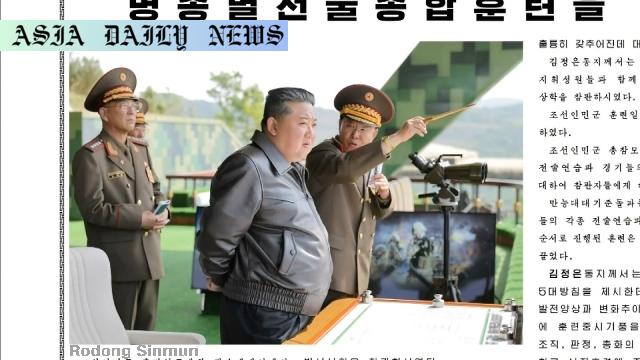Modern Warfare: North Korea’s leader Kim Jong Un spotlighted a drill involving drones, urging military upgrades to adapt to contemporary conflict.
North Korea’s Kim Jong Un oversaw innovative drone drills by the special forces.
The exercise emphasized modern warfare preparedness and adaptability.
Photos suggest ties between North Korea, its special forces, and Russia’s military operations.
Modern military partnerships between North Korea and Russia are reportedly strengthening.

Kim Jong Un’s Strategic Focus on Modern Warfare
North Korean leader Kim Jong Un recently demonstrated his strategic focus on modern warfare capabilities by overseeing a drill emphasizing the innovative utilization of drones. Conducted by North Korea’s special forces, the exercise aimed to advance military readiness in adapting to contemporary conflict scenarios. Wednesday’s edition of the state-controlled Rodong Sinmun highlighted the event, publishing visuals of both tank bombardments and tactical drone operations. These drills were not only designed to exhibit technological prowess but also to reflect on dynamic combat strategies vital in modern warfare.
Revolutionizing Drills for Combat Readiness
The exercises were described as being conducted in an “innovative” fashion with an emphasis on diverse domains designed to simulate real-world combat scenarios. Such initiatives underscore North Korea’s dedication to preparing its forces for actual war conditions. The synchronization between traditional and modern techniques signifies a strategic shift in the country’s military doctrine—aimed at blending conventional approaches with cutting-edge technology.
Military Ties Between North Korea and Russia
Interestingly, South Korean media and Rodong Sinmun implied a connection between these exercises and the ongoing collaboration with Russia. The photos of North Korean military figures shaking hands with Russian President Vladimir Putin on Russia’s Victory Day further emphasize strengthened military ties. While specifics regarding North Korean fighters’ involvement in Russia’s conflict zones remain scant, such gestures reflect shared military interests and potential collaboration on combat expertise.
Implications for Global Security and Regional Stability
The active military drills and the apparent camaraderie between North Korea and Russia have broader implications. They not only signal North Korea’s commitment to modernization in warfare but also place regional adversaries like South Korea and Japan on heightened alert. Additionally, such maneuvers raise concerns about the balance of power within the global geopolitical landscape.
Commentary
Strengthening Military Power Through Innovation
North Korea’s recent drone-focused military drills, personally attended by Kim Jong Un, are an explicit attempt to signal its capability and readiness in modern warfare. The use of cutting-edge technology like drones demonstrates an understanding that conventional methods may no longer suffice in today’s fast-evolving combat scenarios. Kim’s presence also suggests the importance he places on these drills, signaling to both allies and adversaries that North Korea is shifting its defense strategy to meet modern demands.
Collaboration Between North Korea and Russia
The photographs of North Korean generals alongside Russian leader Vladimir Putin point to a growing camaraderie that carries significant weight in the current geopolitical climate. While the exact details of their collaboration remain undisclosed, the move reflects the willingness of both nations to cooperate on military strategies potentially extending to combat experience exchanges. It reaffirms that nations under sanctions, like North Korea and Russia, find solace in each other’s shared adversities and goals.
Risks and Global Implications
North Korea’s advanced military strategies inevitably raise questions about the balance of power in East Asia. Its modernization efforts may provoke a corresponding military buildup in neighboring countries such as South Korea and Japan. Ultimately, these developments highlight the urgency for global diplomatic initiatives to address rising tensions and prevent a potential arms race.


